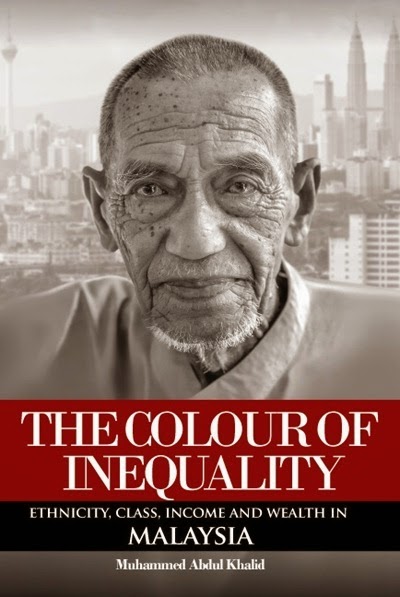Review by econsmalaysia
The Colour Of Inequality
[Full disclosure: Dr Muhammed is a good friend of mine, so the following commentary should be taken as unbalanced and totally biased. You have been warned]
There’s a new book coming out this weekend on income and wealth inequality in Malaysia, at MPH:

If you’re interested in the dimensions of inequality specific to the Malaysian experience, there are two books you must have on your bookshelf. The first is Shireen Mardziah Hashim’s “Income Inequality and Poverty in Malaysia”, which examines the distribution of income in Malaysia and focusing on the period of the New Economic Policy (1970-1990). It’s a bit on the technical side (i.e. it’s not written for non-economists), but the book has a wealth of data you might not find anywhere else. It also shows how the NEP had at best a peripheral role in East Malaysia.
Dr Muhammed’s book is more general, and covers both income and wealth inequality from ancient times to the present. If I were to contrast the two, I would call Dr Shireen’s book a scholarly work for scholars. Dr Muhammed’s on the other hand, while not lacking in scholarship, is very obviously intended for a very different audience.
In some ways the book echoes Piketty’s “Capital” in approach and structure – not too surprising given his PhD was gained in France. This is a book very specific to our times and tries to address contemporary concerns and criticisms, backed by data and evidence, in a fairly accessible package. More importantly, again like Piketty, it’s really a call to action with an explicit policy agenda for Malaysia.
Some of the data and conclusions will be new to many – I’m not going to quote anything, buy the book if you want the details. While awareness of income inequality among and between Malaysians is fairly widespread, the data on wealth are not. Neither is the level of discrimination in the labour force. There’s also more evidence here that Piketty’s conclusion that inherited wealth plays a major role in perpetuating inequality is a correct one.
There’s always a risk of something like this stoking the fires of social controversy – much of the data in the book would make good political and media fodder. Some of the statements in the book would also make uncomfortable reading both for those in power and in the political opposition.
But to define this work solely on some of its more explosive findings would be to miss the larger point – that inequality transcends race, transcends gender, transcends East and West. We’re all in it, like it or not, and its up to us (all of us) to fix it.
There’s a new book coming out this weekend on income and wealth inequality in Malaysia, at MPH:

If you’re interested in the dimensions of inequality specific to the Malaysian experience, there are two books you must have on your bookshelf. The first is Shireen Mardziah Hashim’s “Income Inequality and Poverty in Malaysia”, which examines the distribution of income in Malaysia and focusing on the period of the New Economic Policy (1970-1990). It’s a bit on the technical side (i.e. it’s not written for non-economists), but the book has a wealth of data you might not find anywhere else. It also shows how the NEP had at best a peripheral role in East Malaysia.
Dr Muhammed’s book is more general, and covers both income and wealth inequality from ancient times to the present. If I were to contrast the two, I would call Dr Shireen’s book a scholarly work for scholars. Dr Muhammed’s on the other hand, while not lacking in scholarship, is very obviously intended for a very different audience.
In some ways the book echoes Piketty’s “Capital” in approach and structure – not too surprising given his PhD was gained in France. This is a book very specific to our times and tries to address contemporary concerns and criticisms, backed by data and evidence, in a fairly accessible package. More importantly, again like Piketty, it’s really a call to action with an explicit policy agenda for Malaysia.
Some of the data and conclusions will be new to many – I’m not going to quote anything, buy the book if you want the details. While awareness of income inequality among and between Malaysians is fairly widespread, the data on wealth are not. Neither is the level of discrimination in the labour force. There’s also more evidence here that Piketty’s conclusion that inherited wealth plays a major role in perpetuating inequality is a correct one.
There’s always a risk of something like this stoking the fires of social controversy – much of the data in the book would make good political and media fodder. Some of the statements in the book would also make uncomfortable reading both for those in power and in the political opposition.
But to define this work solely on some of its more explosive findings would be to miss the larger point – that inequality transcends race, transcends gender, transcends East and West. We’re all in it, like it or not, and its up to us (all of us) to fix it.
No comments:
Post a Comment